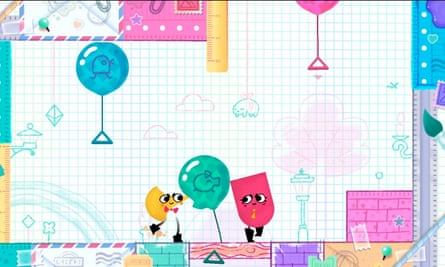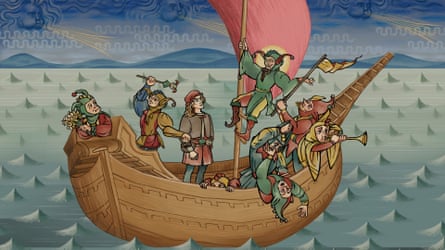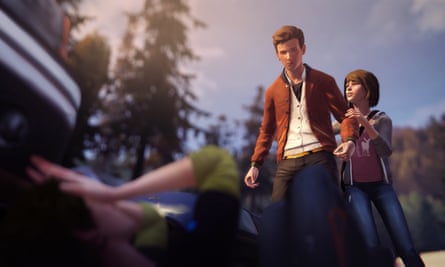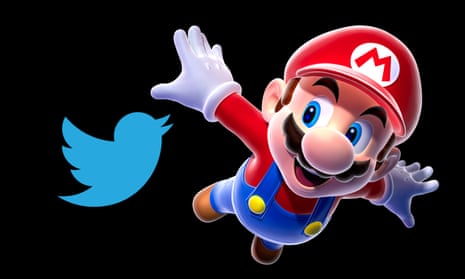The End Days of Twitter have provided plenty of entertainment lately – not least someone using Elon Musk’s new paid-for checkmark system to impersonate Nintendo of America and tweet a picture of Mario flipping the bird. But the chaos that has enveloped the funniest and most infuriating social media platform of them all is also causing consternation for game artists, developers and marketers, many of whom view it as integral to their careers. Very Online millennials make up a huge proportion of the video game workforce, and plenty of us have been networking and snarking on Twitter for our entire careers. If the platform either goes away or changes beyond recognition, it will affect the games industry and how it socialises.
Plenty of games have found real-world success through viral Twitter fame. Trombone Champ is only the latest example, elevated from the crowded field of weekly Steam releases with a tweet shared by PC Gamer. Untitled Goose Game – the beloved comedy game about a foul fowl – also picked up a huge audience there. And Cult of the Lamb is another recent game that owes at least some of its success to developers and fans’ clever use of Twitter: it’s the modern version of word-of-mouth. I have discovered countless games from seeing interesting clips on Twitter. It’s where I first saw the Bafta-winning Unpacking. It’s also where many journalists, streamers and publisher talent scouts hear about forthcoming games, and where players go to find out what’s generating buzz.
Video game Twitter is, like all of Twitter, replete with bad takes, toxicity and and self-indulgently long threads about nothing. But it’s also full of developers sharing clips and screenshots from games they’re working on, showing off their art, posting job opportunities when a big studio closes, sharing knowledge and boosting each others’ work. Twitter has become a natural online home for people working in games: less staid than Facebook, more anarchic than Instagram, less segmented than Reddit.
Almost every game developer I’ve spoken to in the past few weeks has gotten at least one job opportunity through Twitter. This was particularly true for marginalised developers, who might not have the same access to real-life professional networks. “Twitter has been my best networking tool for game dev and personal life,” said indie developer Lucy Blundell. “It’s my top marketing platform and way to connect with other devs. I just don’t get the same connection with Discord, TikTok, Instagram, etc.”
Games industry Twitter is also a valuable social space for some: many developers mentioned the friends and colleagues they’ve gotten to know through joining in on threads. “Mostly I’m sad to lose what feels, despite everything else going on, like a really lovely community of people making games,” said Tom Vian, of SFB Games (makers of personal fave Snipperclips, a genius co-op game on Switch, pictured below). “I hope we can rebuild that.”

We all know, of course, that Twitter can be extremely horrible, too. Ask any of the devs who get harassment and death threats there over minor perceived slights or changes to game balance in huge games like Destiny or Call of Duty. Depressingly, over the years plenty of studios have felt the need to make public statements asking people to stop sending developers abuse. With Twitter gone, would that abuse diminish? Or would it just find other vectors?
I don’t want to draw further unwanted attention to the individual people who’ve been targets of abuse, but my own history with Twitter is inexorably tied up with Gamergate, the 2014 mass harassment campaign that targeted women and games journalists. I’d experienced a lot of abuse on Twitter before that, from people who were so furious about a review score that they’d send me explicit threats, but Gamergate concentrated the latent misogyny and organised it. Twitter did nothing about it. Nor did anyone else, really; a lot of people saw it as inconsequential blustering, rather than what it was: the new playbook for the alt-right culture wars.
Things have improved on the platform. Most of the architects of Gamergate – among them the now-imprisoned Steve Bannon, and many of the staff of his rightwing website Breitbart News – were thrown off. But I could never really see Twitter as a town square again; it never felt like an entirely safe place to share jokes or make observations. But I never could quite let it go, because now and then something hilarious or brilliant would appear in my feed.
But even if you could make the argument that Twitter has, overall, been good for the games industry, it’s more difficult to argue that it’s been good for society. “It’s probably a bad thing for indie discoverability that Twitter is going down the pan, but it’s probably best for everyone overall if it dies and is never resurrected,” said one developer friend. “I think all of us have taken some damage from something on Twitter that we would have otherwise avoided.”
PS: I had so many great responses to last week’s newsletter about the joy of all-night gaming binges. Evidently plenty of you share my fondness for playing through the night. I wanted to share this reply in particular, from reader Debby:
“I have been a gamer for most of my adult life. I too remember staying up til the small hours while my children were asleep! What I would say is, don’t leave it too long to fully indulge your gaming passion. I am 63 and thought I could just go on playing the same kind of games for ever – my favourites being Mass Effect, Fallout and The Last of Us, among many others. Lately, things are not as I had fantasised. My reactions are slower and my eyesight is not as it was, and I just don’t have the stamina for all-nighters. I still work full-time, so maybe when I retire … I joke with my children that if they put me in a care home when I am really old, it has to have the latest PlayStation or it’s not happening!”
Debby, I have joked many times about playing Mario Kart 64 all day with other rad old ladies when I’m in a care home – assuming that we don’t have fully immersive virtual reality a la San Junipero in Black Mirror by then. If the retirement communities of the future are full of lapsed gamers finally indulging their Civ habits, I’m all for it.
What to play

Pentiment, the new title from role-playing game specialists Obsidian Entertainment (Fallout: New Vegas, Pillars of Eternity, The Outer Worlds), does what no historical video game has done before: it imagines the lives of ordinary people living through immense societal change. Instead of playing a knight or a mythical hero, we play Andreas, an artist who illustrates manuscripts around the time the printing press is about to render his job obsolete. It’s a murder mystery narrative game, really, one that works out differently depending on whom you befriend and whom you accuse. But it also imagines what it might have been like to arrive in Bavaria on the precipice of the Reformation.
Available on: Xbox, PC
Approximate playtime: 15 hours
What to read
If you grew up watching Ash Ketchum continually try and fail to be the very best, like no one ever was, then your heart might be warmed by the news that 25 seasons into the Pokémon animé, the lovable trainer is now finally world champion. He’s just a bit of a late bloomer.
Animal Crossing: New Horizons on Switch is now Japan’s bestselling game of all time, superseding the original Pokémon Red and Green games. It has sold 10.45m copies in the region, and more than 40m globally. Tom Nook must be raking it in on all those mortgages.
Remember how, after splitting with longtime partner EA Games, Fifa was going to team up with other developers to create even better games? Well, the first newly licensed Fifa products are a bunch of blockchain/NFT/metaverse products tied into the morally bankrupt Qatar World Cup. That went exactly as expected, then.
after newsletter promotion
What to click
Marvel Snap review – this superhero showdown card game is utterly compulsive
“I craved a bite-size experience”: Ben Brode on the making of Marvel Snap
The Case of the Golden Idol review – delicious Sherlockian murder mystery
You can’t out-shoot a teenager: how to play first-person shooters if you’re over 30
Question block
Reader David poses this week’s question:
“What are some of your favourite games with time-rewind mechanics? And if you could rewind time once per day, would you go back five seconds, 30 minutes, or restart the day from when you woke up?”

The least clever, but also most useful, implementation of a time-rewind in games is also one of the first: racing games. For casual racers like me, being able to rewind a few seconds and try again when you flub a corner or smash into an opponent on a single-player driving game turns the genre from an exercise in frustration into a carefree thrill-ride.
I also love how it works in the original Life Is Strange, a teen drama with a supernatural twist: who among us, as impulsive teenagers, would not have loved the ability to rewind a few seconds to cram the thing you just said back into your mouth? In real life, I’d pick 30 minutes: long enough to go back and order a different option on the restaurant menu, for when I inevitably get food envy, but probably not long enough to mess with the very fabric of time, space and consequence.
